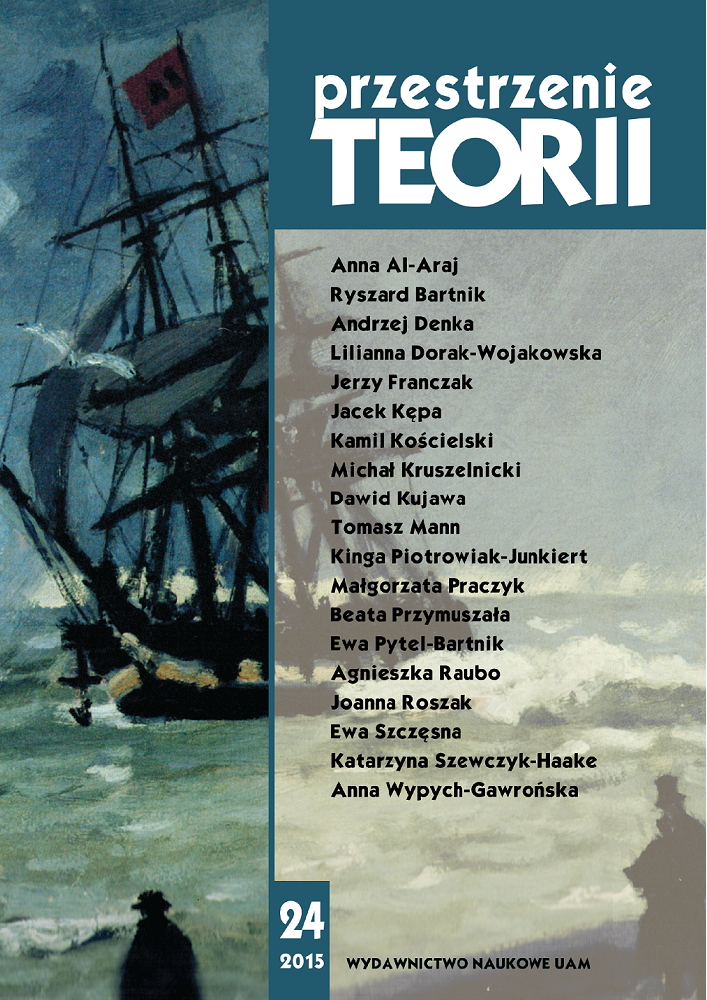Abstrakt
The article reconstructs poetics and politics of Polish westerns, focussing on the two most re-nowned examples of the genre: The Law and the Fist (1964) or The Wolves' Echoes (1968). They are set in the western or eastern borderlands of post-war Poland (1945–1948) and depict the struggles of righteous militiamen against plunderers and looters. The analysis is based on classical theories formulated by A. Bazin, J. Kitses and W. Wright and aims to highlight hidden contradic-tions between the rules of film genre, the requirements of veracity, and propagandist manipula-tion. These movies reinforce the official politics of memory of the Polish People’s Republic. The Law and the Fist contribute to the discourse on the ‘Recovered Territories’ and renew the Piast concept of returning these territories to the traditional Polish homeland. In turn, The Wolves' Echoes shapes the collective memory of the Bieszczady Mountains and justifies ethnic homogene-ity of this borderland.Bibliografia
Alfieri A., The American Western in Italy: Sergio Leone’s dialectic cinema, [w:] New Wests and Post-Wests: Literature and Film of the American West, red. P. Varner, Newcastle upon Tyne 2013.
Bauman Z., Nowoczesność i zagłada, tłum. T. Kunz, Kraków 2009.
Bazin A., Western, czyli film amerykański par excellence, [w:] tegoż, Film i rzeczywistość, tłum. B. Michałek, Warszawa 1963.
Bobowski S., Ziemie Odzyskane w kinematografii PRL-u, „Pamięć i Przyszłość” 2008, nr 1.
Buscombe E., The idea of genre in the American cinema, [w:] Film Genre Reader III, red. B.K. Grant, Austin 2003.
Campbell J., Bohater o tysiącu twarzy, tłum. A. Jankowski, Poznań 1997.
Carter M., Myth of the Western. New Perspectives on Hollywood’s Frontier Narrative, Edinburgh 2014.
Cavelti J.G., The Six-gun Mystique Sequel, Bowling Green 1999.
Hen J., Prawo i pięść, Zakrzewo 2012.
Janion M., Płacz generała. Eseje o wojnie, Warszawa 1998.
Kitses J., Horizons West: Directing The Western from John Ford to Clint Eastwood, London 2004.
Leder A., Prześniona rewolucja. Ćwiczenie z logiki historycznej, Warszawa 2013.
Lenihan J.H., Showdown. Confronting Modern America in the Western Film, Urbana- -Champaign 1980.
Męclewski E., Powrót Polski nad Odrę, Nysę Łużycką, Bałtyk. Szkice, Warszawa 1971.
Michalski Cz., Western i jego bohaterowie, Warszawa 1972.
Perez G., House of miscegenation, „London Review of Books” 2010, nr 22.
Pippin R.B., What is a Western? Politics and Self-Knowledge in John Ford’s „The Searchers”, “Critical Inquiry” 2009, nr 35 (2).
Plesnar Ł.A., Twarze westernu, Kraków 2009.
Przylipiak M., Kino stylu zerowego, Gdańsk 1994.
Saunders J., The Western Genre: From Lordsburg to Big Whiskey, London 2001.
Skoble A.J., Order without law. The magnificent seven, east and west, [w:] The Philosophy of the Western, red. L. Jennifer, McMahon, B. Steve Csaki, Lexington 2010.
Słabek H., Dzieje polskiej reformy rolnej 1944–48, Warszawa 1972.
Tompkins J., West of everything. The Inner Life of Weterns, New York 1992.
Turner F.J., O znaczeniu pogranicza w amerykańskiej historii, tłum. B. Czepil, „Pogranicze. Polish Borderlands Studies”, 2014, t. 2, s. 140.
Wright W., Six Guns and Society: A Structural Study of the Western, Berkeley 1977.
Zaremba M., Wielka Trwoga. Polska 1944–1947. Ludowa reakcja na kryzys, Kraków 2012.
Licencja
Autorzy
Autorzy tekstów przyjętych do publikacji w czasopiśmie „Przestrzeniach Teorii” są zobowiązani do wypełnienia, podpisania i odesłania na adres redakcji umowy o udzielenie nieodpłatnej licencji do utworów, z zobowiązaniem do udzielania sublicencji CC.
Zgodnie z umową, autorzy tekstów opublikowanych w czasopiśmie „Przestrzeniach Teorii” udzielają Uniwersytetowi im. Adama Mickiewicza w Poznaniu niewyłącznej i nieodpłatnej licencji oraz zezwalą na użycie sublicencji Creative Commons Attribution-NonCommercial-NoDerivatives 4.0 International (CC BY-NC-ND 4.0).
Autorzy zachowują prawa do dalszego, swobodnego rozporządzania utworem.
Autorzy, którzy wykorzystują w swoim tekście cudze utwory (np. ilustracje, fotografie) proszeni są o dostarczenie do redakcji czasopisma zgodę na publikację od uprawnionych podmiotów.
Użytkownicy
Zainteresowani użytkownicy internetu uprawnieni są do korzystania z utworów opublikowanych po 2015 roku „Przestrzeniach Teorii” tylko w calach niekomercyjnych, pod następującymi warunkami:
- uznanie autorstwa - obowiązek podania wraz z rozpowszechnionym utworem, informacji, o autorstwie, tytule, źródle (odnośniki do oryginalnego utworu, DOI) oraz samej licencji;
- bez tworzenia utworów zależnych - utwór musi być zachowany w oryginalnej postaci, nie można bez zgody twórcy rozpowszechniać np. tłumaczeń, opracowań.
Do wszystkich tekstów opublikowanych przed 2015 r. prawa autorskie są zastrzeżone.
Inne
Uniwersytet im. Adama Mickiewicza w Poznaniu zachowuje prawo do czasopisma jako całości (układ, forma graficzna, tytuł, projekt okładki, logo itp.).
